Securing food for low-income students
by Annika Holliday ‘20
Food banks are struggling with a decrease in resources and volunteers as the coronavirus pandemic spreads and most are not currently accepting volunteers. Many people who staff volunteer food pantries are retirees who are especially vulnerable to COVID-19 infections.
“Formal and informal safety nets alike are under incredible strain now, and to make sure families don’t go without food, lawmakers need to address both the supply and distribution of aid,” said Elaine Waxman, a senior fellow at the Urban Institute in Why Coronavirus is a Food Security Crisis.
Nearly one in seven households in Oregon were low-income food insecure between 2014-16. Over 316,000 children are at risk of hunger and are eligible for nutrition programs.
Although Gov. Kate Brown recently mandated school closure through April 28, districts must include meals, including take-home meals. Even students who do not have to attend that specific school or district have access to these free grab and go style meals.
In Multnomah County, SUN Community School Food Pantries, in partnership with Oregon Food Bank is providing 3 to 5 days of nutritious food to families for weekend, evening and other non-school days.
Laughing Planet, a restaurant chain based in Portland, is offering free kid meals to families on meal assistance programs at all its Pacific Northwest locations. Students can get a quesadilla or burrito along with a side of corn or broccoli and an apple juice or milk. They are not required to show proof that they are part of a meal program.
There are also many small acts of kindness shown by Oregonians as they purchase and deliver groceries and meals to the family homeless shelters and directly to food insecure families.
“Food security should be at the top of every [coronavirus] briefing,” Waxman said. “If you put some of these things in place nationwide, like the increase in benefits, then you’re dealing with a uniform set of messages, and you don’t have to figure it out based on where you live.”
Adequate nutrition has critical physical, emotional, and cognitive impacts on the well-being of children.

